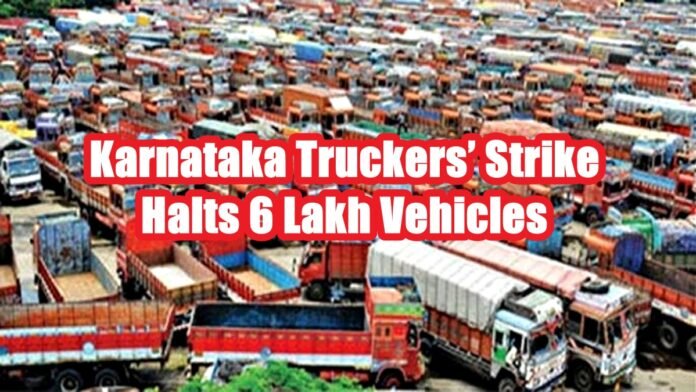
Key Points
- Nearly 6 lakh trucks in Karnataka have gone off the roads as truckers launch an indefinite strike from Monday midnight.
- The strike is in protest against repeated diesel price hikes, increased toll and RTO charges, and alleged harassment at toll plazas and by transport officials.
- Essential supplies, including vegetables, grains, fuel, and medicines, are expected to be severely disrupted across Karnataka and neighboring states.
- Over 60 transport associations from 24 states have extended support; trucks from these states will not enter Karnataka during the strike.
- The government has yet to respond to truckers’ demands, and the strike will continue until their grievances are addressed.
Bengaluru: Karnataka is bracing for major disruptions as nearly 6 lakh trucks have gone off the roads following the launch of an indefinite strike by the Federation of Karnataka State Lorry Owners and Agents Association (FOKSLOAA) from midnight on April 14. The strike, which has the backing of over 60 transport associations from 24 states, is a protest against the spiraling cost of diesel, increased toll and RTO charges, and what truckers describe as persistent harassment at toll plazas and by transport department officials.
Why Are Truckers Striking?
Truck operators say the cost of running their vehicles has become unsustainable due to:
- Repeated Diesel Price Hikes: Diesel prices in Karnataka have been raised twice in the last seven months, with the latest hike on April 1 adding ₹2 per litre. Over the past nine months, VAT on diesel has increased by ₹5 per litre, severely escalating operational costs for transporters.
- Toll and RTO Charges: Truckers allege frequent extortion and harassment at toll plazas, as well as arbitrary and punitive RTO fees. They also protest the continued existence of border checkposts despite GST implementation, and the proposed hike in fitness renewal fees for older vehicles.
- No-Entry Restrictions and Financial Harassment: The association is demanding the relaxation of no-entry rules for trucks in Bengaluru, which they say hampers timely deliveries. They also cite harassment by non-banking financial companies (NBFCs) and microfinance institutions, including unlawful vehicle seizures.
Impact on Essential Supplies
The strike has brought the movement of all categories of freight to a halt, except for trucks carrying milk. This includes vehicles transporting vegetables, grains, medicines, construction materials, petroleum, and LPG. The disruption is expected to hit daily life hard, with supply chains for essential goods in cities like Bengaluru and Chennai already under strain.
Traders warn that prices of vegetables and other perishables could spike, especially in neighboring Tamil Nadu, which relies heavily on truckloads from Karnataka for its daily supplies. The flow of over 4,000 daily loads of essentials from Karnataka to Tamil Nadu has stopped, and around 15,000 trucks from Maharashtra and Gujarat that pass through Karnataka each day are also affected.
Widespread Support and Government Response
The strike has received support from transporters across India, with trucks from 24 states refusing to enter Karnataka during the protest. The Airport Taxi Drivers’ Union has also joined the agitation, suspending operations in solidarity.
Despite the mounting crisis, the Karnataka government has not yet responded to the truckers’ demands. Association leaders have stated that the strike will continue until the government rolls back the diesel price hike and addresses their other grievances.
What’s Next?
With essential supplies already being hit and no sign of a breakthrough in talks, Karnataka faces the prospect of prolonged shortages and rising prices. The truckers’ association has made it clear that only a concrete response from the government will end the strike.


















































